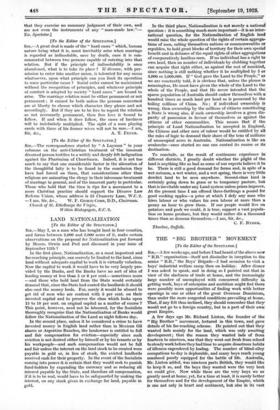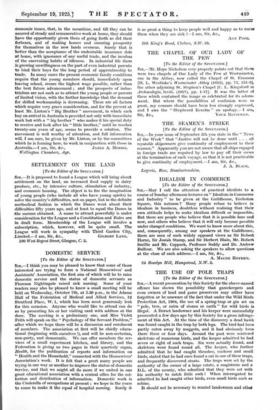THE "BIG BROTHER" MOVEMENT [To the Editor of the SPECTATOR.]
Sm,—A few weeks ago, and before I had heard of the above new " B.B." organization—itself not dissimilar in inception to the senior " B.B.," the Boys' Brigade—I had occasion to visit a, boys' industrial welfare camp then on holiday. After dinner I was asked to speak, and in doing so I pointed out that in view of the slackness of trade at home, and the increasingly large number of unemployed with concurrent difficulty in. getting work, boys of enterprise and ambition might feel there were possibly more opportunities of finding work with better openings in one or other of the great Overseas Dominions, than under the more congested conditions prevailing at home., That, if any felt thus inclined, they should remember that they would not go to a foreign country, but to a part of their ownt great Empire.
A few days ago Mr. Richard Linton, the founder of the " Big Brother " movement, lectured in this town, and gave details of his far-reaching scheme. He pointed out that they wanted lads mainly for the land, which was only awaiting development ; that the reason they wanted lads of from fourteen to nineteen, was that they went out fresh from school* to steady work before they had time to acquire disastrous habits of idleness engendered by loafing. The number of blind-alley occupations to-day is deplorable, and many boys reach young manhood poorly equipped for the battle of life. Australia, Mr. Linton added, was nineteen parts British, they would like to keep it so, and the boys they wanted were the very best we could give. Now while these are the very boys we so greatly need at home, yet, for a time at least, it is surely better for themselves and for the development of the Empire, which is one not only -in heart and sentiment, but also in its vast economic issues, that, in the meantime, and till they can be assured of steady and remunerative work at home, they should have the opportunity given them of going forth as did their forbears, and of making homes and ensuring prosperity for themselves in the new lands overseas. Surely that is better than the acceptance of the undesirable insurance dole at home, with ignorance of any useful trade, and the incubus of the enervating habits of idleness. In industrial life there is growing unwillingness on the part of even industrial parents to bind their boys for the long period of apprenticeship to trade. In many cases the present economic family conditions require that the young members should, immediately upon leaving school, secure the highest wage possible, rather than the best future advancement ; and the prospects of indus- trialism are not such as to attract the young people or parents of limited vision, with the further knowledge that the demand for skilled workmanship is decreasing. These are all factors which require very grave consideration, and for the present at least Mr. Linton's " Big Brother " movement, in which each boy on arrival in Australia is provided not only with immediate work but with a " big brother " who makes it his special duty to receive and look after his " little brother," until he reaches twenty-one years of age, seems to provide a solution. The movement is well worthy of attention, and full information will, I am sure, be given by Mr. Linton, or by the committees which he is forming here, to work in conjunction with those in











































 Previous page
Previous page